Welcome to our column, Russia Update, where we will be closely following day-to-day developments in Russia, including the Russian government’s foreign and domestic policies.
The previous issue is here, and see also our Russia This Week story The Kremlin’s Policy-Making on Ukraine is ‘A Mess’ and special features ‘Managed Spring’: How Moscow Parted Easily with the ‘Novorossiya’ Leaders, Putin ‘The Imperialist’ A Runner-Up For Time’s ‘Person of the Year’ and It’s Not Just Oil and Sanctions Killing Russia’s Economy, It’s Putin.
Right before Putin’s speech began this morning, the ruble, which lost more than 10 points this week, began to recover. A struggle is underway between hardliners and liberals in and around the Kremlin which has been blamed for the ruble fall.
Please help The Interpreter to continue providing this valuable information service by making a donation towards our costsâ€.
UPDATES BELOW
For weeks, Caucasian Knot, a leading independent regional news service, has been reporting about the case of Magomed Aliyev, a 22-year-old Stavropol medical student jailed November 21 on suspicion of terrorism.
Aliyev was rushed from his prison cell to the hospital after he was stabbed in the eye with a pen. Doctors induced a coma, but he did not improve and then in the poor conditions of the hospital, he caught meningitis, and grew even more gravely ill.
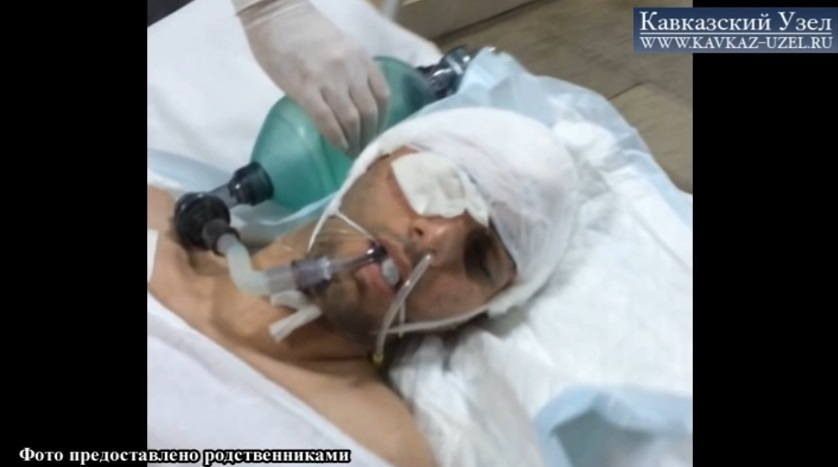
His sister, Aminat Aliyeva, has tried to understand what happened after her brother was arrested. She told reporters that men had grabbed him outside the dental office where she worked in Moscow.
When some other men came to the scene, she thought at first they were going to help. But instead, they beat up her brother and then took him to the police station and accused him of recruiting fighters for Syria. For days he was missing, and then shortly after he was moved to a detention facility in Stavropol, the family learned of his serious injury.
VICE News reported on his case, calling him the “latest victim in the war on terrorism” in Dagestan, where hundreds of young men have been killed by police or arrested, tortured and kept in prison.
As his sister told VICE:
It took the doctors nearly six hours to pull that pen out of his
brain — it went all the way through. That’s how much force went into it.
They were barely able to extract it,” said Aminat Aliyeva, the young
man’s sister, who was with her brother when agents from the Federal
Security Service detained him in Moscow.
Russian prison authorities say that Aliyev stabbed himself. Self-mutilation is common in the Russian prison system, as prisoners attempt to get themselves moved to the infirmary, where conditions and food can be better.
“This fact was recorded on surveillance cameras set up in the man’s cell,” Svetlana Klinchayeva, head of the agency’s press service, said in comments to Caucasian Knot after the incident.
His relatives continued to demand that the video be released, and filed an appeal against the Federal Corrections Service (FSIN) which wants to move him out of the intensive care facility where he is now being treated into a prison hospital where he would not get the required level of care.
Meanwhile, REN TV, a private pro-Kremlin television station uploaded to YouTube a video they say was taken of in his cell.
In the video, a man who appears to be Aliyev can be seen fiddling with a pen near his eye, and then
suddenly falling over. It’s not clear whether he stabbed himself, or
fell on the pen. After an edit in the video, his cell-mate, who was asleep on a bunk, leaps up and
goes to bang on the door for help. It’s difficult to tell from this
video what actually happened.
As his sister points out to VICE:
“Even
if he did it himself, let’s say he did, theoretically, since that’s
what they keep insisting — what would they have been doing to him to
force him to that point?” she said.
Aminat
says that her brother knew some men who had gone to Syria, but
“expressed shock and disapproval of their decision,” she said. The group
he was said to be involved with is Abu Hanif’s jamaat, which is “not
taken very seriously” says terrorism expert Mairbek Vatchagaev of the
Jamestown Foundation.
Caucasian Knot has uploaded a video to YouTube about his case, and Ali Chavrinsky, a reporter from Kavpolit.ru has uploaded a video containing interviews with his sister.
Russia’s ambassador to Belarus, Alexander Surikov, said yesterday in Minsk that 12 combat aircraft and four S-300 systems would be sent to Belarus next year:
“And the first wing of four military helicopters Mi-8 will bolster the on-duty forces in the Belarusian airspace,” the diplomat said.
The ambassador said Russia and Belarus have been successfully cooperating in the military and technical sphere. Some 99 Belarusian and 940 Russian enterprises are involved in this cooperation.
“The share of Belarusian products in the Russian defense order is already 15%,” he said adding that Russia’s defense order is “colossal.”
The S-300 systems (NATO reporting name SA-10 Grumble) are designed to defend major facilities from air attacks. They are considered to be some of the world’s most capable anti-aircraft missile systems.
— James Miller
One month ago the ruble was trading at about 46.85 to the dollar, and people were already talking about the currency’s devaluation. Over the last two days the currency has “stabilized” at about 60-60.70 per dollar. I put that word in quotes because as you can see from the chart below there has been significant volatility over the last two days:
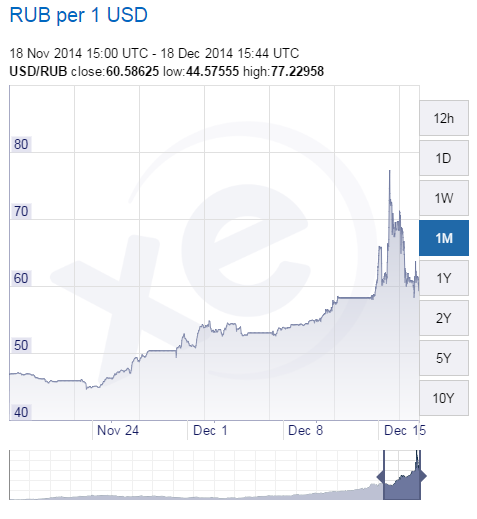
The ruble has also had help from oil prices, which have stabilized over the last 3 days:
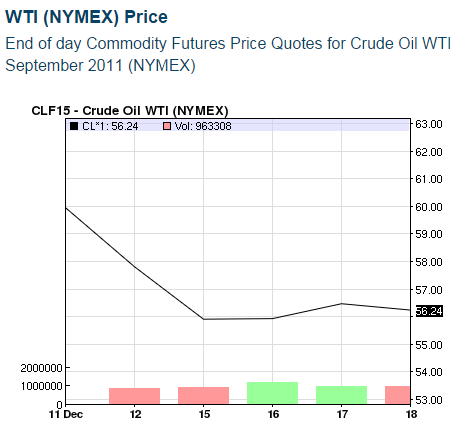
But this brief (and shallow) rally in oil prices is predicted to be temporary. The Wall Street Journal reports:
The global and U.S. crude contracts rallied early Thursday after Saudi Arabia’s oil minister characterized the recent price rout as “temporary” in published comments and said crude demand would recover as the global economy improves. But the market gave back those gains throughout the morning.
“The fall since summer was overdone, too quick and too sharp, and traders might be looking to pick a bottom and gain some money out of it,” said Tamas Varga, an analyst with brokerage PVM Oil Associates Ltd in London. “But this is a temporary relief, at best.”
Indeed, several analysts said Thursday that the bearish fundamental conditions of massive production and shrinking demand remain in place and are expected to continue deteriorating in the first half of 2015.
Still, the timing of the increase in oil prices could not have been better for Putin, as it coincided with a series of moves by Russia’s Central Bank to prop up the currency.
For now it has worked, but Putin’s optimism is likely misplaced. 60 rubles per dollar is still a terrible exchange rate, and with oil expected to head back down in the near future the ruble is hardly out of the danger zone.
— James Miller
A Russian kvass producer has been overwhelmed with orders after a seemingly tipsy journalist asked Putin at his year-end press conference why the drink wasn’t allowed to be sold in supermarkets.
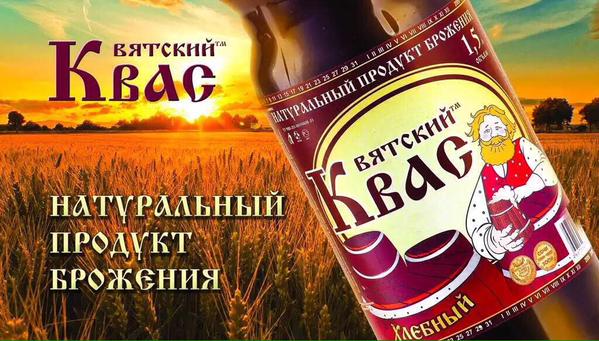
Kvass is a fermented apple cider drink often sold at street stands or dispensers in Russia.
Vyatsky Kvass, made in the city of
Vyatka, got some high-profile free advertising today as Putin joked with
the reporter.
According to a transcript from Izvestiya, Vladimir Mamatov, a journalist from Reporter, a news service in Kirov, asked Putin (translation by The Interpreter):
“Vyatsky Kvas is made in our town. We make a lot of this kvass, we make it well, we’ve made it for a long time. But the problem is that it won’t be put for sale by Auchan and other shopping centers. Although by taste indicators and by price, we beat both Coca Cola and Pepsi Cola and everything they do. What can we do about Vyatsky Kvass and the shopping centers?“
Putin responded by joking, “I sense you already hoisted a few” to laughter in the audience, then acknowledged his preference for domestic beverages, over Western drinks like Coca Cola.
But he said he couldn’t force businesses to do anything.
This
was the gist of his answer to many other questions, ranging from the
ruble exchange rate to the release of Ukrainian POW Nadiya Savchenko
to the orders of Ramzan Kadyrov to burn down the homes of relatives of
terrorists — he couldn’t interfere, because ostensibly business, the
courts, constituent republics of Russia are all things he doesn’t
interfere in.
The owner of Vyatsky Kvass told Izvestiya that
while Auchan did buy his beer, he had tried unsuccessfully for some time
to convince Auchan to put his kvass on their shelves. Even so, the
kvass was available in other stores.
It turns out that Kuragin is a
typical Russian business, according to Izvestiya‘s research. In the Soviet era, he was first secretary of
the Communist Party in his town. This helped him to start a family
business in 1992 after the coup.
Since then, he has had various
misadventures, falling victim to a bank that he claims swindled him of
his deposit, with an excuse that they had to hide their funds from a
police search, although his son, Ilya Kuragin, discounted the story.
Ilya himself was captured by activists of an anti-drunk-driving group called
Night Patrol but admitted his guilt. The company has faced 7 lawsuits
for non-payment for services.
UPDATE:
While Putin himself took the Kirov reporter to be drunk, and many Russian and Western journalists tweeted jokes about him, the Kremlin’s propaganda outlet RT.com has now published a correction:
— Catherine A. Fitzpatrick
Sberbank, the largest Russian savings bank, yesterday December 17 raised interest rates on ruble and foreign currency savings accounts, RIA Novosti reported.
The maximum raise is 2 percent points for ruble accounts and 3.55 percentage points for dollar and euro accounts.
But customers were having trouble getting cash from the ATMs, and Sberbank said they weren’t working for some hours “for technical reasons.”
The Bank of Russia or Central Bank suddenly raised the key rate from 10.5% to 17% on Tuesday, December 16, the day the ruble fell the most it has since the default of 1998. After that, other Russian banks began to raise their interest rates on savings accounts.
RIA Novosti didn’t say what the current rates are at Sberbank, but a world deposit site that may not be up to date says one-year fixed deposits have a rate of 8.60%.
No information is available from Sberbank’s website itself, which has a notice that “maintenance work” is now being done on its servers.
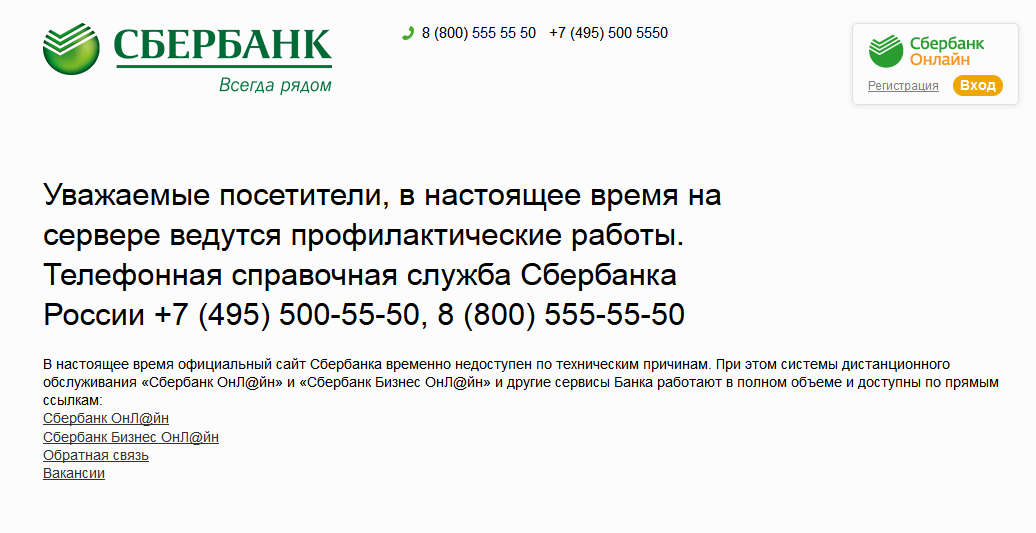
Some of the state media reporters attending Putin’s year-end press conference today are throwing him soft balls, giving him a chance to praises programs for gifted children, for example, and stay away from issues like the war in Ukraine.
A LifeNews correspondent asked at President Vladimir Putin’s press conference today whether he regretted pardoning businessman and former political prisoner Mikhail Khodorkovsky after last year’s press conference, given that Khodorkovsky has been actively involved in opposition politics, and even plans to run for president.
Putin’s answer indicates that the issue is whether Khodorkovsky could return to
Russia, which would be required to participate in elections.
Khodorkovsky is currently living in Switzerland, and has not come
back to Russia after leaving last year to visit his dying mother,
fearing that he had no guarantee of free travel after that.
Independent bloggers and journalists reacted negatively to the provocative question of LifeNews, which is widely believed to be close to Russian intelligence and law-enforcement.
Translation: LifeNews speaks in the favorite style of a denunciation.
Translation: LifeNews simply is the personification of prostitution.
(Note: The Interpreter is a project of the Institute for Modern Russia, which is funded by Pavel Khodorkovsky, son of Mikhail Khodorkovsky.)
Another question followed raptly by Putin’s audience in the press center and online came from Ksenya Sobchak, the daughter of Mayor Anatoly Sobchak, who died suddenly in 2000 after a meeting with Putin to support his election campaign.
Ksenya Sobchak is a famous talk-show host in Russia and was accredited to the press conference from TV Rain — Russia’s only independent TV station recently forced out of its studios and currently broadcasting from a private apartment.
She asked about the role of federal TV in inciting hatred of the opposition and launching persecution campaigns against perceived “fifth columnists” or traitors to the Motherland.
She noted also a widely-condemned false propaganda show by Russia’s TV1 that claimed a Russian toddler was crucified in front of his horrified mother in Slavyansk in southeastern Ukraine supposedly by Ukrainian forces.
Putin never responded to the question about the “crucifixion” show.
Translation: Of course he “forgot” about the crucified boy.
Sobchak asked about the orders given by Ramzan Kadyrov, head of
the Chechen Republic, to burn down the homes of relatives of terrorists
killed in a gunfight with police on December 4. A dozen homes have been
set fire, forcing people to flee.
Putin first spoke at length about Anatoly Sobchak, who he saw as a victim of
official persecution, as two cases against him were opened in one week,
and during the election campaign, the fact of these criminal cases was
noted in leaflets even dropped from planes.
He then replied regarding the house-burnings that such actions were “extrajudicial” and violated
the presumption of innocence which he claimed prevails in Russia,
despite much evidence to the contrary.
Translation: I hope that thanks to the question of @xenia_sobchak quite a few lives will be saved. Thank her for that.
A Reuters correspondent asked Putin about possible “palace coups” with all the instability in the economy. Could there be a plot against him?
Putin deadpanned, “We have no palaces, so we don’t have any palace coups.”
While some might wonder why the Kremlin’s many ancient palaces don’t count, anti-corruption blogger Alexey Navalny instantly tweeted a picture of a lavish mansion of a Kremlin official:
Translation: Putin: calm down, we don’t have any palaces. But the Anti-Corruption Fund’s air service claims otherwise.
Putin later interrupted Dmitry Peskov, spokesman for the presidential administration who has been managing the journalists’ questions, to allow a Georgian reporter to go ahead of a Turkish correspondent — “you’re near each other anyway.”
But then a Russian correspondent who appeared to be intoxicated, took the floor, and Putin said, “You’re not Turkish,” but let him speak.
In fact, the reporter was from Kirov, Russia. He stumbled through a rambling question about why his favorite brand of kvass, or fermented apple cider, is not allowed to be sold in the French supermarket chain Auchan in Russia.
Putin humored the man, making jokes implying that he had sampled his product, and said that non-alcoholic domestic beverages should be favored over Coca Cola, which specialists said could be harmful “especially for children.”
He then quickly backtracked, as if mindful of the big business this represents for Russia, and said “I don’t want to offend Coca Cola, let them do as they wish.”
(Update: Later RT.com reported that the man’s slurred speech was explained by the fact that he had suffered multiple strokes, not because he was drunk.)
— Catherine A. Fitzpatrick
The Kremlin reported today that 1,259 accredited Russian and foreign journalists have gathered at the International Trade Center for the annual press conference of President Vladimir Putin.

An approved list of reporters accredited for the event was issued by the Kremlin earlier this week, and had mainly loyal state journalists, although a few, such as Ekho Moskvy, were allowed one correspondent (not Alexey Venediktov, editor-in-chief, but Alexey Solomin, an Ekho reporter.)
As expected, Putin’s remarks so far have been very upbeat despite the dramatic fall of the ruble in the past week (translation by The Interpreter):
Despite all the turbulence in the financial market, the federal budget this year will be closed with a surplus, that is the income will exceed our expenses by 1.2 trillion rubles, which is approximately 1.9% of the GDP. The Ministry of Finance is still calculating it, but the budget will have a surplus — that’s for sure.
The main result of the year in the social sphere must be named, of course, the positive demographic dynamic.
Needless to say, Western journalists are skeptical:
A lot depends on how bold journalists will be themselves.
And already, a Ukrainian journalist has asked the leading question of the year, but Putin’s response has been predictable, referring to a leading POW, pilot Nadiya Savchenko, who was illegally brought into Russian and accused of helping to murder Russian state journalists killed in the war, who began a hunger strike yesterday.
Putin feigned inability to prevail over a supposedly independence judiciary:
— Catherine A. Fitzpatrick
What appears to have been a protest getting started outside the building were President Vladimir Putin’s press conference is taking place was ended quickly by police.
Police swooped down and removed unknown persons in a group outside the building.
Translation: the action is over.
UPDATE:
Slon.ru has reported some more on the brief protest outside the president’s press conference, in which about 40 people took part and at which at least 20 people were arrested.
Danil Turovsky, who tweeted some pictures from the scene, is a correspondent for Meduza, the independent news site made up of former Lenta.ru editors and journalists now in Riga. He told Slon.ru:
People came out of the Vystavochnaya Metro but not even a minute passed before the police came up and asked them if they had permission for their protest. People went about 10 more meters, then a police van drove up and then a second one, and then about 20 people were detained, including a journalist, according to an eye-witness.
It is not clear who organized the protest, but journalist Yevgeny Levkovich had made an appeal to gather before the president’s address near the International Trade Center on his Facebook page:
Please don’t ask what we will do there. We will ask questions of Putin, the majority of which he will not answer — for the simple reason that they will not be heard at the press conference. We want the existence of these questions and the cowardice of the president, who fears speaking directly with people set against his rule, to be known as widely as possible by the citizens of Russia. What comes next will depend only on our numbers.
— Catherine A. Fitzpatrick
As James Miller explained in his article It’s Not Just Oil and Sanctions Killing Russia’s Economy, It’s Putin, this week’s dramatic plunge in the ruble is explained in the Western media for many reasons — the drop in the price of oil, Western sanctions, ineffective responses by the Central Bank, and so on.
But in fact, these don’t explain the deeper reasons — there is little empirical evidence that sanctions cause the ruble to drop now, when they were imposed in the spring and summer and actually caused the ruble to rally back then.
Nor can the drop in oil prices really explain what’s happening, either — much less the “Russophobia” that Kremlin propagandists always attribute to explain away legitimate criticism of the Russian government.
Instead, investors have been scared off by Putin’s oligarchism, exemplified by the most expensive and corrupt Olympics in history, from which his cronies were the chief beneficiaries of $50 billion in construction loans and gifts from state coffers. By contrast, there is the trend to prosecute not this kind of blatant corruption, but other business people who challenge Putin politically, like anti-corruption blogger Alexey Navalny.
The Russian opposition is often portrayed as marginalized and no longer able to pull large crowds out on to the streets.
Yet it’s important to realize that the reason we even know about topics like Olympics corruption or focus on issues like the opaque Rosneft bonds sale this week is the continued existence of at least a small Russian opposition prepared to suffer reprisals to speak their minds.
These vocal figures say what liberals inside the system think — and sometimes try to act on quietly. One theory for why they are still allowed to exist is that the Kremlin still concedes the need for real feedback amid the noise of its own propaganda.
Former government officials who long enjoyed Putin’s trust have an outsize impact now in expressing internal Kremlin struggles, in part because of Twitter. One tweet from Aleksei Kudrin, Putin’s finance minister from 2000-2011, has come to define the crux of the crisis this week in Russia:
Opposition figures Boris Nemtsov and others seized on the announcement of the loans to accuse Rosneft of benefiting from the ruble crisis. The same day, the Bank of Russia made an announcement canceling another loan auction. Economist Alexei Aleksashenko published a post on slon.ru on Tuesday December 16 saying the market was reacting to the news of Rosneft’s bond sale:
The ruble lost 10% in a day, and I’m not sure it will end there today —
it is possible it will fly further. I think this is the action of two
factors. First, this is a reaction to the Rosneft bonds — or rather the
money which was given Rosneft came on to the currency market.I
am not saying that Rosneft bought currency, but we should not be taken
for idiots: I have no doubt that Rosneft put money in its “daughters”
[affiliate companies]; the “daughters” placed money in banks, and the
banks placed money in [foreign] currency. Because if there is a chance
to earn 5-10% a day, you’d have to be a total idiot not to make use of
this.
As we reported December 16,
while the opposition was blaming Sechin, Igor Sechin himself held a
press conference where he blamed the opposition, including
anti-corruption blogger Alexey Navalny, Boris Nemtsov and former finance
minister Alexey Kudrin for causing the ruble to fall:
As always, you have to note who is spreading these rumors.
There is a method in ministries of distracting attention on a disliked
object, in this case, which is enabling us to reach the main goal, which
is placing interested parties before itself. In this case, the disliked
object is the company Rosneft.
We have to investigate the interested parties and
provocateurs. Who are these people, these Navalnys, Nemtsovs, and
Kudrins, what purposes are they achieving.
Sechin further justified his actions:
“Rosneft had earned $118 billion in the first 9 months of the year, of
which $75 billion was sold on the Russian market (up from $60 billion
last year). He also said Rosneft would pay 3 trillion rubles in taxes
($41.1 billion) and that would “undoubtedly be an element of
stabilization for the currency market, the money market as well.”
But disbelief in Sechin’s claims not to have sold rubles for foreign currency persisted:
Translation: @navalny But it was official though (It would have been strange if Sechin came out and said, “Yes, we dumped it because we need [foreign] currency. Sorry.”
Translation: @belogolovcev But no one believes that. I think Aleksashenko is right and they did this through the bank of subsidiary companies.
The question now is how it will go further — will Sechin prevail in
sparking a new crackdown on figures like Kudrin or Nemtsov, forcing them
into exile, like leading economist Sergei Guryev or sentencing to prison others like Navalny, who is awaiting a verdict in a trial for trumped-up embezzlement charges before the end of the year? Will the Russian
censors move against the Twitter and Facebook accounts of such figures
or block these Western platforms completely, as has been threatened if
they fail to comply with a new law requiring all servers with Russian
customer data to be maintained on Russian soil?
Or will their valid complaints about cronyism and lack of financial
transparency, backed up by Western sanctions and loss of investor
confidence, force Putin to rein in his hardline oligarch friends and
liberalize politics and the economy?
“There has not been such an open conflict between siloviki and
liberals in a long time,” commented Gazeta.ru, using the term for
hardliners in industry and the power ministries of army, intelligence,
and law-enforcement.
Again, while social media was
undoubtedly a factor in the crisis, the opposition figures only said
what more conservative traders were thinking after state media itself
published the news and the fact remains that neither the deal or the
workings of oligarch companies are transparent, which fuels mistrust.
Says Gazeta.ru:
It
is believed that Kudrin and Sechin are people from the closest circle
of President Vladimir Putin. Obviously the struggle for the right to
define the economic course of the government has grown more fierce
against the backdrop of the rapidly turns of the crisis.
Most likely
there are some ‘old’ oligarchs behind the ex-minister of finance
[Kudrin], some of the members of government (but not Prime Minister
Dmitry Medvedev who apparently has ceased to interfere in these fights)
and the financial sector. Old friends and the industrial-agrarian lobby
are behind the head of Rosneft.
The Russian ruble could become the
“victim” in the struggle between these forces.
The term “financial Maidan” — picked up by many commentators
now — seems to have been coined by a blogger named crimson_alter on
Politrussia.com who said (translation by The Interpreter):
“After the raise in position, the speculators should
have been ‘washed away,’ but we are not dealing with ordinary
speculators here…we have encountered a phenomenon that I would call a
‘financial Maidan’.”
In his view, not “rational speculators” but “ideologically
charged representatives of the financial class” exploited the market
because they believe that their job is to “break the government” and
force the government to “sell foreign currency for rubles, and beg the
US to cancel sanctions.”
Mikhail Leontyev, vice president of
Rosneft told Gazeta.ru he blamed Kudrin’s policies for a decade as in
fact the reason for the current ruble collapse:
“Kudrin’s policy is complete affiliation, or, as they
say, ‘openness’ before the global, that is, American regulator. The
foundation of the policy was the systematic raising of the real exchange
rate of the ruble which increased 4 times from 2000 to 2012. Thus, the
conditions were created for maximum use of natural rent on the purchase
of imported consumer goods and the stifling of the domestic producer.
Therefore there is practically no competitiveness in the market sector
in our country.“
He added that the loan market is stifled with 20% interest
which only organizations with “criminalized or sub-criminalized”
purposes can afford.
“As a result they have driven the economy into a
recession out of nothing, even with the maximum prices for oil. And said
that the possibilities for growth without any liberalization are
exhausted. Why are they exhausted? They are exhausted because of the
currency rate policy even without any sanctions.”
The sanctions only “kill this policy,” he says, so now those
who obtained an advantage from this economic system “have only one
opportunity to survive — force Putin to surrender.”
Depending on
which side in this struggle wins, there may be some visible personnel
shifts. He said Rosneft had no complaints about Elvira Nabiullina head
of the Bank of Russia, who was “forced to shovel the legacy of another.”
Yevgeny
Fyodorov, a hard-line United Russian member of the State Duma
associated with the ultranationlist Russian Liberation Movement (NOD),
has demanded an investigation of the Central Bank, saying it has not
coped with “the protection and guarantee of the stability of the ruble.”
Gazeta.ru believes that if the siloviki get
their way, we will see more “cheap and long-term” cash loans to
stimulate the economy. If the liberals like Kudrin hold sway, a tighter
loan policy will stay in place, and Nabiullina will keep her job. Most
likely Putin will not want to strengthen either group so as not to make
any too-abrupt moves.
— Catherine A. Fitzpatrick
Hours before President Vladimir Putin is scheduled to give his year-end speech, the ruble is showing some signs of recovery from its dramatic plunge earlier this week.
The Washington Post said the ruble was stabilizing, but Putin and the Kremlin remain at risk:
The ruble settled Wednesday near 61 to the dollar, a recovery from
Tuesday, when it had spiked as high as 80, but still far above 33, its
level at the start of the year. The weakened currency drives up prices,
makes it harder for companies to repay loans that were taken out in
dollars or euros, and waters down Russians’ savings.
Yesterday December 17, Prime Minister Dmitry Medvedev convened the National Security Council to address the crisis.
In a sign that the Kremlin viewed the crisis not just as an economic
threat but as a danger to Russia’s fundamental security, the Russian
Security Council said Wednesday that it had drawn up a response plan and
given it to Putin to review. The head of the council, Nikolai
Patrushev, a former head of the successor agency to the KGB, did not
disclose details. The body usually focuses on matters of war and peace,
and it is highly unusual for it to become involved in economic
policymaking.
“The government and central bank have begun working seriously on
stopping this bacchanalia on the currency market,” Putin aide Andrei
Belousov told Russian news agencies after the meeting.
— Catherine A. Fitzpatrick